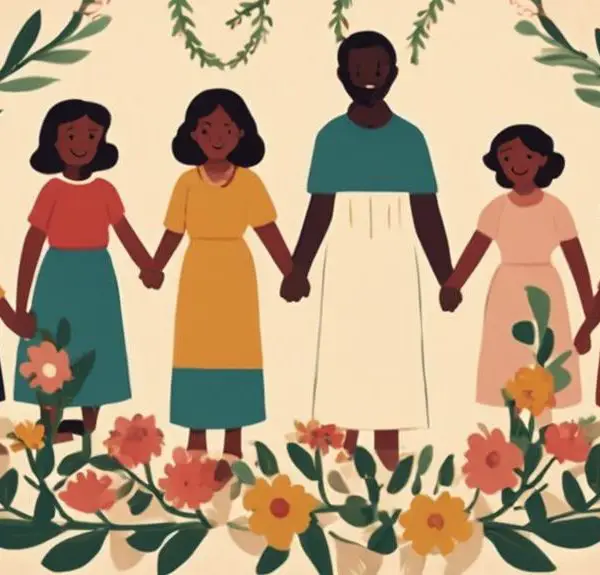Marvel at the depth of love and forgiveness portrayed in a profound Bible verse, prompting a deeper exploration of divine grace in our everyday lives.

A Bible Verse About Love and Forgiveness
Consider the verse in Colossians 3:13, 'Bear with each other and forgive one another if any of you has a grievance against someone. Forgive as the Lord forgave you.' This passage showcases the profound connection between love and forgiveness in the Christian faith.
But what does it truly mean to forgive as the Lord forgave us? How does this divine forgiveness and love translate into our daily lives and relationships? These questions might spark your curiosity, beckoning you to explore further.
Key Takeaways
- Divine love in the Bible encompasses unconditional and sacrificial affection, extending to all individuals.
- Forgiveness is a foundational concept in Christianity, requiring continuous practice and liberating believers from resentment.
- Corinthians illustrates love as patient, kind, and virtuous, emphasizing its role as an action, not merely a feeling.
- Parables such as the Prodigal Son and the Unforgiving Servant highlight the power and necessity of forgiveness in the Christian faith.
Unveiling the Concept of Divine Love

Delving into the concept of Divine Love, you'll find it as an embodiment of God's unfathomable affection, a love that transcends human understanding and sets the foundation of our faith. It's an extraordinary kind of love that's unconditional and sacrificial, making it a cornerstone of Christian spirituality.
You're no stranger to human love, with its conditions and limitations. But Divine Love is different. It's a love that doesn't discriminate, doesn't judge, and knows no bounds. It's an all-encompassing love that reaches out to every person, regardless of their status, race, or creed. It's a love that's steadfast, unchanging, and able to withstand the harshest of trials.
Forgiveness in Biblical Perspective

As you explore the vast expanse of Divine Love, another critical aspect of Christian spirituality comes into light: the concept of forgiveness as presented in the Bible. It's not just an optional virtue, but rather an essential component of the Christian faith.
The Bible doesn't merely suggest forgiveness, it commands it. In Colossians 3:13, you're instructed to forgive others as the Lord forgave you. The act of forgiveness isn't just about releasing the offender from their wrong, but also about liberating yourself from the bondage of resentment. It's a conscious decision to let go of the past, thus making room for God's peace to fill your heart.
However, forgiveness in the biblical sense isn't a one-time action. It's a continuous process, a lifestyle. In Matthew 18:22, Jesus exhorts you to forgive not just seven times, but seventy times seven. This implies a perpetual state of forgiveness, showing that it's not the magnitude of the offense that matters, but the depth of your mercy.
Thus, forgiveness in the Bible isn't a passive concept. It's an active, ongoing commitment, serving as a testament of your love towards God and fellow beings.
Exploring Love in Corinthians

In the heart of Corinthians, you'll discover the essence of love, beautifully encapsulated in the poetic words of Apostle Paul. This love isn't merely a fleeting emotion or a superficial feeling. It's a selfless, unending, and transformative force that transcends human understanding.
Paul's description of love in 1 Corinthians 13 serves as a timeless reminder that love is patient and kind, never envious, boastful, or proud. This passage isn't a romantic sonnet; it's a profound exploration of love's true nature. Paul challenges you to view love not as a mere sentiment, but as an action. He underscores the importance of love as a guiding principle in your interactions with others, insisting that it's the cornerstone of a virtuous life.
It's worth noting that Paul's words aren't a call to love in the abstract, but a call to a specific kind of love—agape. This is a self-sacrificing, divine love that seeks the highest good for others. It's the love God has for us and the love we're called to extend to others. Understanding this aspect of love can dramatically reshape the way you view and practice love in your own life.
Parables Highlighting Forgiveness

While exploring the notion of forgiveness, it's pertinent to delve into Jesus' parables, which often used this theme to impart profound spiritual truths. These parables, which you may find familiar, effectively encapsulate the essence of forgiveness, demonstrating its transformative power.
Consider the Parable of the Prodigal Son, where a father forgives his wayward son unconditionally. This parable shows forgiveness in the context of familial love, reminding us that forgiveness is a choice and is not dependent on the actions of the wrongdoer.
Similarly, in the Parable of the Unforgiving Servant, Jesus emphasizes the importance of forgiving others as we have been forgiven by God, highlighting the profound connection between divine and human forgiveness.
Parable |
Key Lesson |
|---|---|
The Prodigal Son |
Forgiveness is unconditional and not dependent on the actions of the wrongdoer. |
The Unforgiving Servant |
We should forgive others as we have been forgiven. |
Through these parables, Jesus underscores the transformative power of forgiveness, prompting us to introspect and apply these teachings in our lives. These narratives serve as a timeless reminder of God's infinite love and mercy.
Love and Forgiveness: A Symbiosis

One might find that love and forgiveness aren't mutually exclusive, but rather, they form a symbiotic relationship, each fueling and sustaining the other in our spiritual journey. To truly love someone, you must extend forgiveness, and to forgive genuinely, love must be present. It's a dynamic interaction where one can't thrive without the other.
Consider a biblical perspective. The Bible teaches that God's love for us enables His forgiveness, and this divine forgiveness fuels our capacity to love. In the same vein, you're called to reflect this symbiotic relationship in your interactions with others. When you love, you're more inclined to forgive, and when you forgive, it's a manifestation of your love.
However, it's not easy. Love and forgiveness are challenging, often demanding a sacrifice of pride and the willingness to see beyond faults. Yet, it's through this symbiotic interaction that spiritual growth occurs. As you learn to love more deeply, you also learn to forgive more readily, and vice versa.
Therefore, recognize this symbiosis between love and forgiveness as a vital part of your spiritual journey, embracing its transformative power to shape your relationships and your understanding of God's love.
Conclusion
In conclusion, you'll find that love and forgiveness aren't just abstract concepts, but divine principles deeply woven into the fabric of Christianity. Corinthians unravels love's depth while parables illuminate forgiveness's power. They're not independent, but symbiotic – one can't truly exist without the other.
Embrace these teachings, for in doing so, you're not only growing spiritually, but also fostering a kinder, more understanding world. Remember, love and forgiveness are more than virtues, they're ways of life.



Sign up